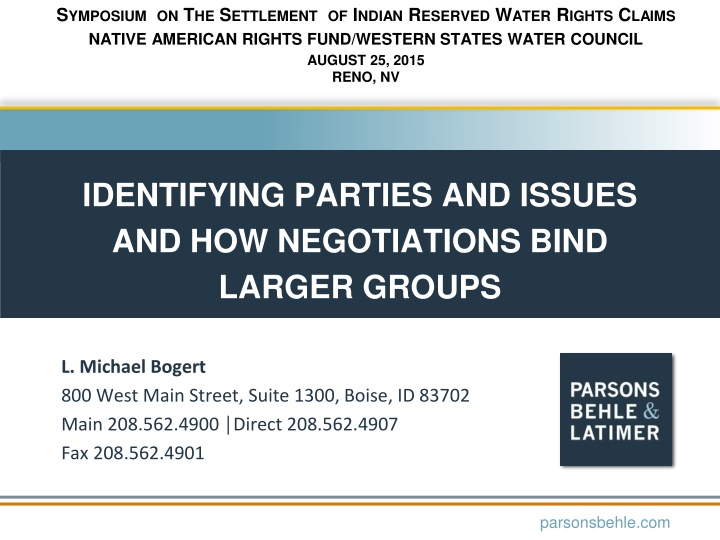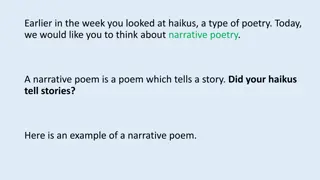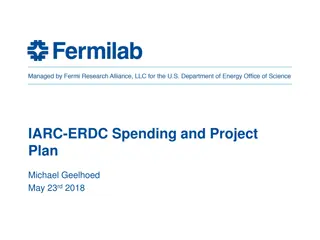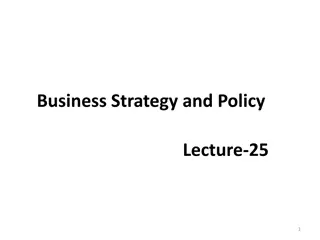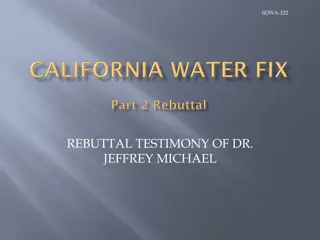Symposium on Settlement of Indian Reserved Water Rights Claims
Exploring the complexities of settling Indian reserved water rights claims, this symposium delves into key issues faced by Tribal Leadership and State authorities. The discussions emphasize the significance of water negotiations in shaping the economic future of Indian Country and maintaining state sovereignty. Case studies and fundamental deal structures provide insights into navigating the intricate relationships between Indian communities, the United States government, and state entities.
Download Presentation

Please find below an Image/Link to download the presentation.
The content on the website is provided AS IS for your information and personal use only. It may not be sold, licensed, or shared on other websites without obtaining consent from the author.If you encounter any issues during the download, it is possible that the publisher has removed the file from their server.
You are allowed to download the files provided on this website for personal or commercial use, subject to the condition that they are used lawfully. All files are the property of their respective owners.
The content on the website is provided AS IS for your information and personal use only. It may not be sold, licensed, or shared on other websites without obtaining consent from the author.
E N D
Presentation Transcript
SYMPOSIUMON THE SETTLEMENTOF INDIAN RESERVED WATER RIGHTS CLAIMS NATIVE AMERICAN RIGHTS FUND/WESTERN STATES WATER COUNCIL AUGUST 25, 2015 RENO, NV IDENTIFYING PARTIES AND ISSUES AND HOW NEGOTIATIONS BIND LARGER GROUPS L. Michael Bogert 800 West Main Street, Suite 1300, Boise, ID 83702 Main 208.562.4900 Direct 208.562.4907 Fax 208.562.4901 parsonsbehle.com
I. INTRODUCTION Settle? Die? 2
I. INTRODUCTION (cont.) Water: Why are these deals different? Life blood of irrigated agriculture; Economic future in Indian Country. Whether, and how, to settle water claims are the most important decisions made by Tribal Leadership; and State sovereignty maintained through McCarran Act proceedings and the ability to get United States interests aligned though the lens of state law. 3
I. INTRODUCTION (cont.) With water negotiations, the relationships forged now will continue into the future; 4
I. INTRODUCTION (cont.) The often tricky relationship between Indian Country and the United States, always a moving target; What does it mean to be a Fed? Many hats to wear and interests to balance; e.g., DOI agencies v. trustee v. OMB (White House). Relationships with the States: real relationships or just lip service? 5
II. DISCUSSION 1. Fundamentals of a Deal; 2. Case Studies: Klamath Hydropower Settlement; and Bill Williams River Water Rights Settlement Act of 2014 6
II. DISCUSSION (cont.) 1. Fundamentals of a Deal; Understanding of interests, not just negotiating positions; Solve all the World s problems or incremental progress (phased settlements?); and Shared risk to keep the deal together. 7
II. DISCUSSION (cont.) Federal Interests: Winters doctrine, Winters v. United States, 207 U.S. 564 (1908): Water must accompany federal land reservations, particularly acute for Southwest Indian Tribes. Unsettled Winters claims consign uncertainty over State-law systems of water management because Indian water rights cannot be lost due to nonuse and have a priority date no later than the date of the creation of a reservation. 8
II. DISCUSSION (cont.) State Interests: Sovereignty; Unique opportunity of McCarran Amendment proceedings, 43 U.S.C. 666 (1952): Opportunity by State constituencies to directly confront the impact of powerful Federal law such as the Endangered Species Act and the Clean Water Act because Federal agencies with legal obligations are at the table. 9
II. DISCUSSION (cont.) Interests of Indian Country: Sovereignty (sound familiar?); Economic certainty; Attention from the Trustee: More often that not, fundamental needs outstrip competition in government (state and Federal) for human resources and limited time. 10
II. DISCUSSION (cont.) Non-Federal Interests: Again, through McCarran Amendment proceedings, ability to develop relationships not otherwise attainable. First Question: Is a general stream adjudication even available? Sometimes, out of sheer frustration and desperation, relationships may be developed in advance of administrative bureaucracy. 11
II. DISCUSSION (cont.) Solve all the World s problems or incremental progress (phased settlements?): While the settlement process evolves, life on the Reservation that necessitates the need for water is not necessarily getting better; Underlying and fair policy: settlement certainty through comprehensive conclusion to litigation; World s problems solved: See Snake River Act of 2004; Phased settlements? See Hualapai Phase One. 12
II. DISCUSSION (cont.) Shared risk to keep the deal together: The hard part before and after getting to yes; No party will ever compromise on fundamental interests unless the other parties also do so; Shared risk includes the calculus of a litigation outcome if there is no agreement. 13
II. DISCUSSION (cont.) Example One: Klamath Key ESA Driver: No one actually believed that once the irresistible impulse (water) finally met the immovable object (Endangered Species Act), that irrigated agriculture would lose to fish; A difficult hydrosystem; and In 2008, a willingness by PacifiCorp, with the support of the Bush Administration and Secretary Kempthorne, to explore dam removal. 14
II. DISCUSSION (cont.) Example Two: Bill Williams River Water Rights Settlement Act of 2014 Close relationship with Freeport-McMoRan and Hualapai Tribe developed outside the normal course of Arizona s general stream adjudication; Bill Williams River watershed was confluence of several interests of the Tribe, the Company and the United States, including the Company s Bagdad Mine, location of a National Wildlife refuge, and ESA-designated critical habitat of listed Southwest willow fly-catcher; 15
II. DISCUSSION (cont.) Example Two Bill Williams River Water Rights Settlement Act of 2014 (cont.) The Lower Colorado River Multi-Species Conservation Program (LCR MSCP), was at play in this part of Arizona; Company received water supply assurances for Bagdad Mine; Tribe received non-Federal contribution of $1 million to assist in funding studies to develop the most appropriate infrastructure for delivery of Colorado River water directly to the Reservation; and Tribe also received Freeport funding for a significant economic development fund. 16
III. CONCLUSION Some people try to find things in this game that don't exist but football is only two things - blocking and tackling. - Vince Lombardi 17
